Introduction to volumes 1 and 2
Published online by Cambridge University Press: 05 June 2012
Summary
The present volume and its companion discuss three ideas that have played an important role in the history of science, philosophy and civilization: criticism, proliferation and reality. The ideas are presented, explained and made the starting points of argumentative chains.
The first idea, that of criticism, is found in almost all civilizations. It plays an important role in philosophies such as Buddhism and Mysticism, it is the cornerstone of late nineteenth-century science and philosophy of science, and it has been applied to the theatre by Diderot and Brecht. Criticism means that we do not simply accept the phenomena, processes, institutions that surround us but we examine them and try to change them. Criticism is facilitated by proliferation (vol. 1, ch. 8): we do not work with a single theory, system of thought, institutional framework until circumstances force us to modify it or to give it up; we use a plurality of theories (systems of thought, institutional frameworks) from the very beginning. The theories (systems of thought, forms of life, frameworks) are used in their strongest form, not as schemes for the processing of events whose nature is determined by other considerations, but as accounts or determinants of this very nature (realism, see vol. 1, chs. 11.15f).
- Type
- Chapter
- Information
- Realism, Rationalism and Scientific MethodPhilosophical Papers, pp. ix - xivPublisher: Cambridge University PressPrint publication year: 1981



